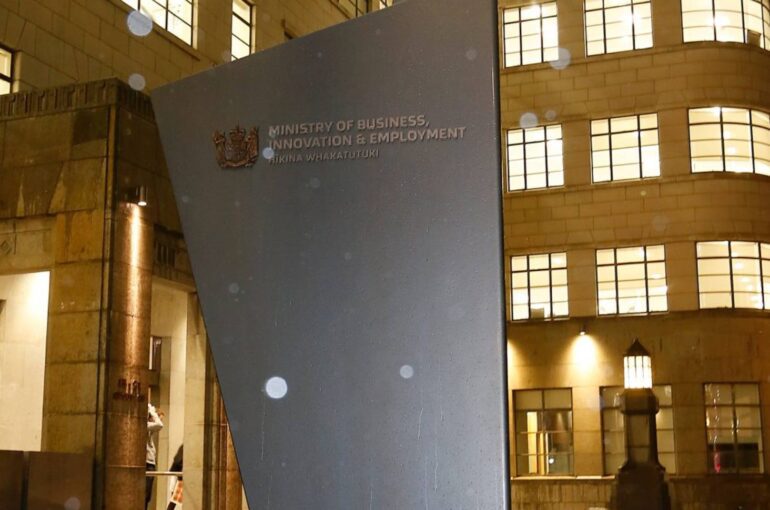TL;DR:
- The Ministry of Business, Innovation and Employment (MBIE) has banned staff from using AI technology like ChatGPT due to data and privacy risks.
- Similar measures have been implemented by large banks and technology companies worldwide.
- New Zealand lacks comprehensive rules or guidelines for AI usage in government agencies.
- MBIE has halted AI tool access to address concerns about sensitive information exposure.
- Caution is advised, as the consequences of AI technology remain unknown.
- New Zealand needs legislation to regulate AI use and protect information privacy.
- The government is working on guidance for agencies in this regard.
- Privacy Commissioner emphasizes the responsibility of individual agencies to evaluate and mitigate AI risks.
- Clear guidance and safeguards are necessary for staff dealing with sensitive information.
- Many international companies, including Apple and Samsung, have restricted or banned AI tool usage.
- ChatGPT, an AI language model, presents challenges in data vetting and retrieval.
- Privacy concerns have prompted investigations and temporary bans on AI products.
- OpenAI has made privacy adjustments, but concerns persist.
- Europe has stricter privacy laws and higher sanctions compared to New Zealand.
- Privacy Commissioner advises caution and privacy risk assessments when using AI.
- Collaboration between the public and private sectors is crucial for establishing safe AI practices.
Main AI News:
The Ministry of Business, Innovation and Employment (MBIE) has taken a decisive step by prohibiting its staff from utilizing artificial intelligence (AI) technology, including ChatGPT. This move comes in response to the perceived risks associated with data security and privacy. Notably, several prominent banks and technology companies, such as Apple and Samsung, have implemented similar measures overseas.
Despite these actions, New Zealand currently lacks comprehensive regulations or guidelines governing the employment of AI across government ministries and agencies. To address the pressing concerns surrounding privacy, caution is being advised. Internal documents from MBIE reveal that in March, the ministry restricted staff access to various AI tools, including ChatGPT, as they feared the inadvertent exposure of sensitive information.
MBIE has opted to temporarily halt the use of AI technology until its safety and viability can be thoroughly assessed. Nikki Chamberlain, an esteemed AI law expert and senior law lecturer at the University of Auckland, emphasizes the prudence of exercising caution. She asserts that the consequences of this emerging technology are yet to be fully understood, and only time will reveal whether the information inputted into AI systems will be adequately protected and kept private.
Moreover, New Zealand currently lacks specific legislation or regulations pertaining to AI, as highlighted in internal MBIE documents, which state the absence of rules or guidelines concerning the utilization of AI tools by government agencies and staff. While the government is actively developing guidance for agencies, the Department of Internal Affairs’ Government Chief Digital Officer emphasizes that their own staff has not been prohibited from utilizing AI tools.
Privacy Commissioner Michael Webster emphasizes that the decision to employ AI ultimately rests with individual government agencies and companies. If the associated risks are deemed too high, it is expected that such proposals will be abandoned. Frith Tweedie from consultancy firm Simply Privacy highlights the need for clear guidance and safeguards to assist staff in navigating the appropriate and inappropriate use of AI tools. For agencies handling particularly sensitive information, a complete ban may be deemed necessary.
The issue of AI usage extends beyond New Zealand, with various international companies, including Apple, Samsung, Amazon, JPMorgan Chase, Deutsche Bank, and Goldman Sachs, either banning or limiting staff access to AI technology. ChatGPT, for instance, is a language model trained by processing vast amounts of internet data. While it offers comprehensive responses to questions by predicting the next word in a sequence, it presents challenges in terms of data vetting and retrieval. Concerns over privacy have prompted Canada’s privacy watchdog to launch an investigation into OpenAI, the organization behind ChatGPT, while Italy briefly banned the use of the product.
OpenAI has recently implemented tighter privacy settings for ChatGPT, but questions regarding privacy persist. Tweedie advises caution, suggesting that organizations and individuals should exercise care by disabling chat history and refraining from inputting confidential or personal information into the system. Compared to New Zealand, Europe boasts more rigorous privacy laws and stricter sanctions.
Chamberlain argues for the necessity of legislation in New Zealand to govern AI usage, particularly with regard to the handling and utilization of information stored by AI systems. Until comprehensive laws are in place, precautions must be taken. In the meantime, the Privacy Commissioner has issued guidelines for agencies and businesses considering the implementation of AI technology. This includes assessing the necessity and proportionality of AI usage and conducting privacy risk impact assessments to identify and avoid potential areas of concern.
Ultimately, a collaborative effort between the public and private sectors is needed to establish best practices for the safe and responsible use of AI technology. As New Zealand navigates this uncharted territory, it is crucial to strike a balance between innovation and the protection of privacy and data integrity.
Conclusion:
The prohibition of AI technology usage by the government ministry due to data and privacy concerns reflects a growing awareness of the risks associated with AI. This move aligns with similar actions taken by banks and technology companies worldwide. The absence of comprehensive regulations highlights the need for legislation to govern AI use in New Zealand. Businesses operating in the AI market should anticipate increased scrutiny and demand for privacy safeguards. Collaboration between different sectors is necessary to establish industry-wide best practices and ensure responsible and secure AI implementation.

